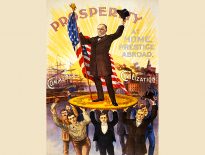23 Things About Capitalism – Things 3 to 5

This post is the second in our series on 23 Things about Capitalism, based on the book by Ha-Joon Chang. Today we’re covering things 3 to 5.
You can find the first post in this series here.
Contents
- Thing 3 – Wages reflect productivity
- Thing 3b – People in rich countries are paid too much
- Driving
- We can’t all be rich
- Thing 3c – Conclusions
- Thing 4 – The internet is revolutionary
- Thing 4b – The washing machine is more revolutionary
- Everyone had a maid
- World wide damp squib
- Resource allocation
- Thing 4c – Conclusions
- Thing 5 – Assume the worst about people
- Thing 5b – If you do, then you’ll get the worst
- Public vs private
- Thing 5c – Conclusions
Thing 3 – Wages reflect productivity
People in western economies are paid a lot more than people in the third world.
- Living costs compensate for some of this difference, but not all.
The theory according to some ((I’m not sure who – I don’t see this as a particularly free market or neo-liberal position )) is that wages reflect relative productivity.
- Artificially raising wages in the third world (for example, via minimum wage legislation) would destroy jobs.
- Either the jobs would relocate to countries without this legislation, or – if there were minimum wages throughout the third world – they would relocate to the first world, where people are more productive.
Thing 3b – People in rich countries are paid too much
Ha-Joon correctly points out most of the difference in wages is down to immigration control.
- Wages are therefore set largely by a political process.
Where we differ is that I think this is a good thing.
If global migration were unrestricted, workers from poor countries would move to rich countries, depressing wages there.
- We’ve seen this happen recently in the UK, with mass migration from eastern Europe.
The shortage of workers in poor countries would push up wages there.
- After a (probably turbulent) period of adjustment, wages should approximately level out, at least at the bottom.
For Ha-Joon, the difference in productivity between countries exists only at the top of the pile.
- Rich people in rich countries are more productive than rich people in poor countries
because they have been rich for longer. - They have inherited an infrastructure of institutions, networks and knowledge – of technologies, better organised firms, and better physical infrastructure – that make it easier to be productive.
Once again, I agree, but I think that maintaining this advantage this is a good thing, at least from the perspective of the rich country.
Driving
Ha-Joon uses the example of bus drivers in Sweden and India.
- As of 2010, the Swedish bus driver’s wage was 50 times that of the Indian bus driver.
Obviously, the Swedish bus driver can’t be 50 times more productive.
- It’s not clear even how it would be possible to drive 50 times better than someone else.
We could argue that the Swedish driver has better driving training and must comply with more regulations.
- It’s also probably true that the Swedish diver has more “human capital” (general education and specific skills around passenger management) – but most of this won’t be needed for bus driving.
- And we could also argue that the roads in India are more chaotic, and the Indian driver has a more difficult job.
The real issue is that bus driving – like hair dressing and similar jobs – can’t be exported or off-shored.
The Swedes need a bus driver in Sweden, and they have to pay him a living wage to do the job.
- Because the average productivity in Sweden is so high, the going rate for a living wage is also high.
- And because they can’t import a cheaper bus driver from India, they pay the Swedish version a bit more than they might need to.
Society is responsible for a very significant percentage of what I’ve earned. If you stick me down in the middle of Bangladesh or Peru or someplace, you’ll find out how much this talent is going to produce in the wrong kind of soil. … I work in a market system that happens to reward what I do very well disproportionately well. – Warren Buffett
The wealth in Sweden comes from – as Ha-Joon puts it – a few “top managers, scientists and engineers in world-leading companies such as Ericsson, Saab and SKF who are hundreds of times more productive than their Indian equivalents”.
- It’s interesting to hear a right-wing argument like this coming from such a left-wing economist.
- The same is true of the UK, but it’s become impossible to say as much in public.
Of course, Ha-Joon credits the system rather than the individuals for their success, but I think that both are necessary.
- It’s true that – as Warren Buffett has pointed out – many of our first world skills wouldn’t get us very far in the developing world.
- But without some talented people to take advantage, the infrastructure of the first world would be wasted.
We can’t all be rich
So we come to Ha-Joon’s fundamental point.
- The living standards of most people in rich countries depend on immigration controls to keep out equally productive people from poorer countries who would work for less.
Ha-Joon sees immigration control as the elephant in the room, in the sense that free market economists pretend that it doesn’t exist.
- This seems like a straw man argument to me.
- Immigration has been a big deal here in the UK for most of my life, and has recently become more of a big deal than ever. ((Admittedly, particularly after Ha-Joon wrote his book ))
But he’s right in the sense that free marketeers – and right wingers in general – are usually opposed to minimum wage legislation and other labour market restrictions,yet they approve of immigration controls.
As Ha-Joon himself points out:
I am not arguing that immigration control should be abolished … Countries have the right to decide how many immigrants they accept and in which parts of the labour market. All societies have limited capabilities to absorb immigrants, who often have very different cultural backgrounds.
The problem with controlled immigration is that rich countries are likely to accept two types of people from developing nations – the already rich and the very talented.
- Thus we rob poor countries of capital and brains, hindering their development.
- It’s another example of first-mover advantage in a winner-takes-all situation.
Thing 3c – Conclusions
I’m going to give Ha-Joon the full point on this one, because his basic point is true, even if we disagree about its implications.
This takes him up to 1.5 points out of three, or 50%.
Ha-Joon is right to say that people are not paid what they are worth.
- Wages vary massively between countries, partly because of immigration controls, and partly because of inherited infrastructure built up (or not, as the case may be) over many generations.
But within a country it is possible (though far from compulsory) that wages are fair, and people are paid according to their talents and efforts.
- There is no read-across for flattening wages within a nation.
Free markets are a red herring here.
- A government can intervene in markets that aren’t operating correctly.
- And from the viewpoint of a national government, a labour market that suppresses the wages of its citizens and converts wages into remittances back to the mother countries of its immigrants is probably not working correctly.
Once again, if we analyse at the country level rather than globally, there is no reason to expect conditions to be the same across countries.
- And there is no argument for doing anything about the natural variation in wages and inherited infrastructure.
Thing 4 – The internet is revolutionary
According to Ha-Joon, the free market position is that the internet has led to the “death of distance and a borderless world”.
- Individuals, firms and nations need to be ever more flexible, which means greater liberalisation of markets.
This is not in aggregate an argument I hear made by many politicians.
- Multinational corporations probably think that way, and there’s little doubt that the internet had supported and accelerated the forces of globalisation.
- This can be seen as a good or a bad thing depending on where you sit in the process.
Thing 4b – The washing machine is more revolutionary
Ha-Joon thinks we have a recency bias – we see the newest changes as the most revolutionary.
- He thinks that “wired telegraphy” in the nineteenth century was more revolutionary.
He also thinks that the washing machine and other household appliances had greater economic and social impact, by freeing women to enter the labour market and almost wiping out domestic service as a job.
This is a tricky one.
- The recency effect is real, but that doesn’t mean we’re wrong to think that exciting things are afoot.
One of my favourite sayings is “the biggest difference is between nought and one”.
- It’s another way of looking at diminishing returns.
To use an example that’s close to home for us all, indoor plumbing is a wonderful thing.
- But two bathrooms aren’t twice as good as one, or even close.
- To make good use of three bathrooms, you’d need a lot of people staying in your house.
But with networks, things work in the opposite direction.
- A network becomes exponentially more useful as more people connect to it.
I’ve no doubt that when the telephone was invented in the nineteenth century, the leap forward – of being to instantaneously cheat distance – must have been extraordinary.
- But with only two telephones in existence, who would you call?
Close to a century later, there was only one telephone on the street I grew up in (in the house of the local taxi driver) and that was too expensive for any of us to use.
- Phones in our pockets were still thirty years in the future.
The point about the internet is that it is now in my pocket, and it knows where I am, and it has everything in there.
- This is not like making a phone call.
It’s definitely revolutionary in terms of how we live our lives, but whether it will re-write the rules of economics is another matter. ((In saying all this, it’s important to remember how much the internet – and smartphones – have changed in the six years since Ha-Joon wrote his book ))
- When I was young I couldn’t have dreamed of writing this blog, but that doesn’t mean that it will move the needle on the nation’s GDP.
Everyone had a maid
According to Ha-Joon, the standard US Spanish textbook from the 1970s said that “everyone in Latin America has a maid” – a logical impossibility (maids don’t have maids).
- But even today 7.8% of workers in Brazil and 9% in Egypt are domestic servants.
- In the UK the figure is 0.3%, and for the US its 0.6% – it’s even lower in Scandinavia.
But even up to the 1920s, 10-14% of workers in the UK were servants.
The reason for the change is obvious – wages are much higher and people much are more expensive relative to things (labour-saving machines in this case) than they used to be.
- In Brazil and Egypt, people are still cheap.
Everywhere else, cheap machines have replaced the maid, and saved everyone a lot of time.
- Washing machines save more than five hours per load (including easier ironing).
- Vacuums and central heating also save a lot of time.
- Even running water saves hours in developed countries relative to developing ones.
This means that women have the time to go out to work, which in turn makes having children expensive (due to opportunity costs), leading to fewer children. ((The contraceptive pill is also a big factor in these changes ))
World wide damp squib
Compared to these changes, Ha-Joon thinks the internet has only impacted leisure time (surfing the net, chatting on Facebook and Skype, playing games etc).
- It has made prices more efficient, initially for insurance and holidays, but increasingly for everything else.
But he’s not impressed with the impacts on production. ((He does admit that writing books with remote collaborators has become easier ))
- I think he’s jumping the gun, and we’ll see dramatic effects over the next 50 years.
- Especially as an enabler of machine learning, AI, automation, robots and the internet of things (see here for more on this).
Ha-Joon also thinks that the telegraph has had more impact than the internet, by reducing transmission time (eg. for a letter) by a factor of 2,500 times.
- By the time the internet came along, we had the fax, so the increase in speed is only a factor of five.
But faxes aren’t machine readable, and much of what moves around the internet is.
- That’s where the real revolution will come – when people aren’t needed to process the information.
Other massive areas of improvement include photos and search.
Resource allocation
Much of this is a matter of opinion, but where it gets serious is in the allocation of resources.
- This, as we have said before, is the main point of economics – how to handle scarcity.
- There isn’t enough to go around, and we need to decide who gets what.
Ha-Joon worries that countries like the US and the UK place too much emphasis on technology and intellectual property and not enough on manufacturing “things”.
- I think he has a point – we’ll come back to this in more detail in Thing 9.
He also worries that charities are too focused on the “digital divide” between rich countries and poor countries.
- They spend too much money on third-world computers and internet access – hoping that this will enable poor countries to catch up – and not enough on water supplies, electricity grids and cheap white goods.
Thing 4c – Conclusions
I’m going to give Ha-Joon half a point here.
- It’s too early to tell whether information technology like the internet will have the revolutionary impact of nineteenth and early twentieth century technology.
- I think in the end that it will – not least because of robots and AI – but we may have to wait another twenty to fifty years to find out.
So his score is now 2 points from four things – still 50%.
I also think that while automating away human drudgery is a good thing, it’s not without social consequences.
- The emancipation of women into the workforce has no doubt been a boon for those individual women.
- But the resulting semi-breakdown in the family unit and lower birth rate in western countries have impacted societies and the planet in ways that are not all good.
- I expect the same will be said about the coming revolution in automation and machine learning.
Thing 5 – Assume the worst about people
I think there’s a serious danger of straying beyond the boundaries of economics with this Thing, but let’s give it a go.
It is not from the benevolence of the butcher, the brewer, or the baker that we expect our dinner, but from their regard to their own interest. – Adam Smith
Traditional free market advocates believe that even if people act selfishly (ie. in the interests of their families) then “the invisible hand” of the market will make sure that the outcome is good for everyone.
- The intended contrast is with socialism / communism, which needs everyone to work hard for the common good, and assume that everyone else will do the same.
My first issue with this is that “selfishness” as defined here is far from the worst thing you could assume about people.
- Designing an economy – or a society – around people with a strong sense of self-preservation and self-reliance should be perfectly straightforward, as history has shown.
My second problem is that my definition of self-interest goes no further that asking “what’s in it for me?”
- If the answer is nothing, you might find something better to do with your time and effort.
All I understand by self-interest is rational analysis. ((Of course I understand that all of us act irrationally at times, but that doesn’t affect the moral argument ))
Thing 5b – If you do, then you’ll get the worst
Ha-Joon takes self-interest to the next level, and assumes that such people will cheat.
- On his model, if self-interest dominates, then we chase our tails trying to prevent cheating.
He then takes the absence of such cheating to mean that people are not driven by self-interest.
- He further extrapolates to say that since people are not so driven, we can design a system that exploits whatever other motivation is behind our good behaviour and “gets the best out of people”.
I think that the market polices “cheating” automatically, and that attempting to exploit people’s better natures is worse than making them wage-slaves.
Public vs private
Fleshing out his theory, Ha-Joon characterises cheating as:
- overcharging by shopkeepers
- goofing off by workers, and
- managers growing their salaries and prestige rather than profits for the shareholders.
We’ve already covered the third point as part of Thing 2, so I won’t go into much detail here.
Each of these problems should be easily fixed by the market:
- a shopkeeper charging more than the market price won’t sell anything
- a worker who can be easily replaced (and whose output can be measured) will work hard
- managers of firms with low profits will see those firms go bust or be taken over by better firms.
Politicians and civil servants, who have long operated in less free markets offer a useful contrast in this regard.
- They are generally understood to be amongst the most self-serving and corrupt parts of society.
We also have the example of communism’s failure to look towards.
A bit further down the same pole comes the unionised public sector.
- There can be few people who would argue that the London tube drivers’ unions are really motivated by the safety of the public as they claim.
This control of self-interest is the main argument behind minimising the size of the state and maximising the size of the private sector.
Ha-Joon cites business leadership books and autobiographies by succesful managers as evidence for his claim that the route to success in business is to connect with and inspire employees, using these other motivating factors.
This is true up to a point, but not a good thing for the “inspired” workers.
- Far better to share the spoils with them as you go forward than to give them a warm feeling until they are no longer required.
- A job for life isn’t on offer any more, and pretending your employer is your friend isn’t going to end well.
It’s like saying that the best way to sell more washing powder is to get consumers to connect emotionally with the brand.
- It’s true, but it’s not making the world a better place.
Or we could all follow in the footsteps of L. Ron Hubbard and start our own religion.
- But that doesn’t work out so well for the followers.
Ha-Joon also cites the effectiveness of “work-to-rule” as evidence that people normally do more than the rules require.
True again, but:
- this was much more common under socialist and communist regimes than in free markets
- in capitalist societies it’s much more common in the more corrupt countries (eg, Italy) and in the more antiquated and unionised manufacturing sectors than in service industries
Can you spot a trend?
It’s true that teams need to be self-organising, and to take collective responsibility for their output, but that merely reflects the fact that some jobs are too big for one person, and self-interest sometimes requires a few colleagues to lend a hand.
- It doesn’t mean that a free-rider in such a team should be – or would be – tolerated.
There are rewards and sanctions – physical, financial and social – that operate everywhere in society, even if they are not obvious.
- People may sometimes (though not often enough) think about their long-term interests, and so appear to be acting against their short-term interests, but they remain self-interested.
Society’s conventions govern how we operate.
- We behave well to others in expectation that they will behave well back to us.
- This is self-interest with a time delay.
- If these rules begin to break down, they will quickly be abandoned, and what appears to be altruism and trust will disappear.
Mrs. Thatcher famously said “There is no such thing as society – there are individual men and women, and there are families”.
- What she meant was not that there is no set of common rules, but that when people act, they act for themselves, and not to make society better.
And she was right.
Thing 5c – Conclusions
This has been an uncomfortable thing to discuss, but I’m going to score Ha-Joon zero on this one.
That takes his score to 2 out of 5, or 40%.
- I don’t agree with his idea of the worst in people, or that self-interest necessitates cheating.
- I think that free markets offer policing of bad behaviour at no cost.
- I think that the public sector should be minimised down to natural monopolies, and that the private sector should be maximised.
- I think that people work out the rules of society – or of an employer – and act within them to secure the best outcome
But only under extreme conditions (natural disasters and wars) will people sacrifice their own interests for those of strangers.
- Everywhere else, we need to trust them to look out for themselves, and hence look out for us all.
We’ll be back in a week or so, with another three Things.
- I hope they will be less gruelling than today’s set.
Until next time.








